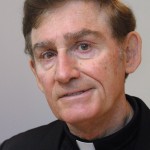When we respond, “Lord hear our prayer” to the offertory petition at Mass, “Let us pray for priestly vocations,” what should we include in this petition?
Having worked in seminary formation, I can say that the formation of seminarians is awesome work in need of much prayer.
During a recent faculty seminary meeting, in which we were judging the competencies of seminarians, I suddenly felt uneasy. “Why,” I thought, “do I feel uncomfortable?”
I am a parish priest primarily. My main ministry is serving people coping with complex and often difficult challenges. My role is not to judge whether they are competent or should belong to the parish, but to walk with them.
[hotblock]
On the other hand, an important role a seminary faculty fulfills is judging whether a man has a vocation and qualifies to be a priest. Although the goal of the faculty is to support seminarians, it also has the responsibility of evaluating them at a critical juncture in their life.
This is an awesome responsibility because God ultimately calls a man to the priesthood. It places the faculty in the role of judging whether God is truly calling a man, casting the faculty into the world of grace so it can discern whether a seminarian is graced with a vocation.
When we respond, “Lord hear our prayer,” let us remember the faculty responsible for vetting a man in priestly formation.
Today's seminarians include older men with multiple career backgrounds and young men with no career backgrounds. Serving both groups is simultaneously a tall order. Why? Employing pedagogical methodology is preferred for young people, while andragogy, the art or science of teaching adults, is preferred for older people.
In younger people, the glass of knowledge and experience may only be half filled. In older people, it is mostly half to full. In the pedagogical approach, a person is introduced to a new world of ideas and experiences. In the andragogy approach, teachers work closer with ideas and experiences an older person has already amassed.
When we respond, “Lord hear our prayer,” let us pray that seminary faculties will respond effectively to the wide range of students under their tutelage.
Seminary faculties literally eat, mingle, advise and support seminarians 24/7; it is a full-time commitment. In praying, “Lord hear our prayer,” let us pray for those who wholeheartedly devote their entire lives to seminary work.
When we pray for vocations, let us especially pray that God will inspire men to think of the priesthood and spreading God's wisdom in an age in which human wisdom must go hand and hand with God's wisdom to succeed.
***
Father Eugene Hemrick, a priest of the Diocese of Joliet, Ill., works as a researcher in Washington and is a Catholic News Service columnist.



Share this story